In the past three years, Diplomacy&Commerce magazine provided its readers with an abundance of news from politics, business and culture, reported on the opinions of relevant stakeholders both from Serbia and abroad, covering all segments of life, and opened up topics that were not written or talked about enough. With its latest issue, Diplomacy&Commerce is celebrating its third anniversary in Serbia. In the past two years, we have launched Diplomacy&Commerce magazine in Croatia (2017) and Austria (February 2018), and our next stop is Slovenia (2019). We are very proud of the fact that we have managed to interview the leaders of the Serbian, Croatian and Austrian political, business and diplomatic community, as well as the renowned regional and global public figures. For this special birthday issue, we have asked the Serbian government officials, the representatives of institutions and embassies, as well as the representatives of business associations in Serbia to give us their opinions about Serbia’s perspective regarding the EU membership, the climate in the West Balkan region and global political and economic issues.

Questions:
1. This year is marked by uncertainty, caused by the possible consequences of Brexit, the upheaval in the EU and the United States-China relations. Which event would you identify as the potentially riskiest for this region and for Serbia’s EU accession process?
2. Do you think that the reforms in Serbia are on the right track? What would you set as priorities in 2019?
3. Do you think that the EU enlargement to the Western Balkans will remain on the EU agenda, or do you think that it will disappear from it all together in 2019?
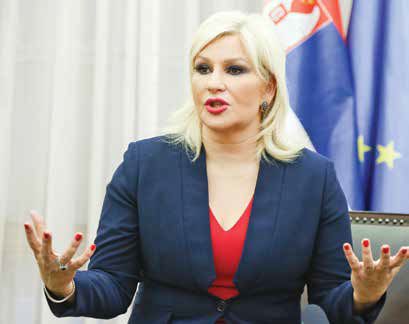
Professor ZORANA MIHAJLOVIĆ, PhD, Deputy Prime Minister and Minister of Transport and Infrastructure: WE EXPECT BIGGER PROGRESS ON DOING BUSINESS LIST
1. There are many such challenges, from the issue of Kosovo and the situation in Bosnia and Herzegovina in the immediate environment, through the upcoming elections for the European Parliament, and an attempt to change the rules of world trade. Serbia is too small to be able to influence in any way the relations between world powers, although changes in these relations do affect Serbia’s position. What we can do, in the best interest of our citizens, is to strive to improve our relations with all our partners, in accordance with our national interests. Maintaining stability in the region remains a priority for Serbia, because we believe that without stability there is no economic development or new investments, which are crucial for a better future for the whole region and all the people living in this region. I believe that infrastructure projects play an important role in promoting cooperation, and therefore preserving stability, because there is an unambiguous interest of the whole region, supported by the European Union, to connect via infrastructure, because only connected people can enable faster economic development, new investments and provide better conditions for the life of citizens.
2. Since 2014, the Ministry implemented deep-rooted changes in all segments with the view of undergoing a comprehensive regulation and improvement of construction sector, transport policy and faster and more efficient investments in infrastructure. In 2019, we are going to embark on a new investment cycle in infrastructure worth more than 5 billion euro, which, among other things, includes the construction of the Preljina-Požega motorway stretch, the Moravian corridor, the Ruma-Šabac-Loznica fast road, and the continuation of the construction of the Belgrade–Budapest fast railway. We are also continuing with the ongoing reforms in the railway and road sector, as well as in the construction industry. One of the most important reforms currently being implemented in the field of civil engineering is the reform of the cadastre. In 2018, we introduced a one-stop-shop system that begins and ends in the notary’s office, and replaces the previous visits to five different administrative counters. We are also starting a new reform of E-Space, that will enable electronic preparation of the planning documents, which expedites the entire process, makes it transparent and facilitates the issuing of documents based on those plans. This year, we expect greater progress on the World Bank’s Doing Business List, because in 2018, we were not happy with our ranking, mostly because some other countries were faster and implemented more reforms than we did.
3. Accession to the European Union is a two-way process, and Serbia has demonstrated that it is prepared to do everything in its power to become a full-fledged EU member. Our goal is to make Serbia closer to the developed countries and EU members in terms of standards and regulations, because that is important for our country and our citizens. Serbia is a country that has opted for membership in the European Union, and regardless of the current turbulence in the EU, it contributes to the political stability in the region and its networking, and carries out reforms that are essentially bringing the country closer to the EU, which, at the same time, entails a better life for our citizens.

ZORAN DJORDJEVIĆ, Minister of Labour, Employment Veteran and Social Affairs Government of the Republic of Serbia: BUILDING STRONG AND TRANSPARENT INSTITUTIONS
1. The greatest risk to US-China relations in 2019 is the potential for “the trade war” to intensify. Given that the EU is our largest trade partner, we do not expect that the eventual crisis in the US-China relations will directly affect Serbia’s economy, but there could be indirect consequences. Great Britain leaving the EU is an event that has already begun to fundamentally re-examine the very foundations of European integration. Apart from the political consequences of Brexit, the potentially most risky events for Serbia and our European integration are the relations between the EU and Russia and the resolution of the Kosovo and Metohija issue. The Ministry of Labour, Employment, Veteran and Social Affairs is responsible for two chapters in the process of negotiations with the EU. In terms of Chapter 2 (Freedom of Movement for Workers), our negotiating position has been submitted to the Chairman of the Council of the EU Chairman on July 24th, 2018, and we expect this chapter to be opened in 2019. In regard to Chapter 19 (Social Policy and Employment), the drafting of the Action Plan for the gradual transposition of EU acquis in this area into the legislation of Serbia is ongoing.
2. The results of the Serbian government achieved so far are sufficient indicators that reforms implemented have been more than significant for the economic recovery of the country. During 2019, the Government’s priorities will be higher investments in education, science, research & development, modernization of public administration, investments in health care and infrastructure. In 2019, the Ministry of Labour, Employment, Veteran and Social Affairs plans to adopt several important laws that will lead to significant improvement in the field of social protection (Law on Amendments to the Law on Social Protection, the Law on Social Entrepreneurship, the Social Card Law). In the following period, in addition to regulatory aspects, building strong and transparent institutions is very important, which our operational and strategic plan will focus on.
3. Given the fact that the next European Parliament elections will be held from May 23rd to 26th, 2019, the issue of EU enlargement to include the Western Balkan countries will largely depend on the outcome of these elections. The EU’s strategy for the Western Balkans envisions Serbia and other countries in the region possibly becoming EU members by 2025. For the first time ever, thanks to this strategy, Serbia has been given an indicative timeframe for EU accession. Whatever the EU’s decision might be, that will determine the outcome of future events – “freezing out” would result in negative effects for Serbia, plus there are difficult decisions that we, ourselves, have to make. However, this is not only the issue related to the relations between the EU and Serbia, but also to other strategic interests which are diffracted and taking shape in the Western Balkans and which have repercussions on us and the EU, but also on other global strategic interests globally outside this region. In conclusion I would like to say that the EU’s decision is unilateral, but it will also have strong bilateral consequences and strategic repercussions that cannot be clearly seen at this time.
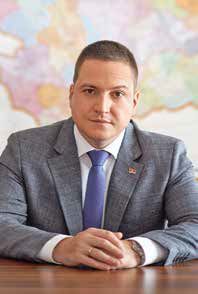
BRANKO RUŽIĆ, Minister of State Administration and Local Self-Government: REFORMING PUBLIC ADMINISTRATION IS DRIVING FORCE BEHIND ALL CHANGES
1. Our basic foreign and political aim is a full-fledged membership in the EU and it is important that we understand that nobody is forcing us to become an EU member but rather, if we are to become a member, we would be in the company of the most developed and economically stable countries, where the flow of goods and services is free, which facilitates the ease of life and raises the living standard on a higher level. These are the reasons why we are constantly talking about the importance of fulfilling our obligations on this path, and I do not mean it only on the state level, but also at the local one too. Our progress in the European integration process is conditioned by the negotiations between Belgrade and Priština, and given that Priština is reluctant to abolish the tax on Serbian products, I do not see how we can proceed with the negotiations until that happens. On the other hand, it is beyond doubt that the EU faces a number of challenges, but I would not agree with the claim that its very survival is in jeopardy.
2. They definitely are and there is no doubt about that. I think that the Serbian citizens agree with us. We have achieved macroeconomic stability, reduced public debt and unemployment, and the economy is doing well. The public administration reform, that I coordinate, is crucial both for joining the EU and for radically changing the work of the public administration, because the administration should not be an obstacle to the changes, as it has been for many years in support, but rather a support. We have built a new foundation with the adoption and implementation of laws such as the Law on General Administrative Procedure, which facilitates the exchange of information between civil servants, rather than asking citizens for that information, the Law on e-Government, which makes the use of the state-of-the-art technologies mandatory for civil servants, the Law on Inspection Oversight, which completely changes the work of inspections, the reform of the human resource management system which goal is to find the type of a civil servant that we really need and to motivate them to work, and last but not least, e-services in various fields that facilitate the public administration’s work. We are continuing to improve each segment of our work and I would like to underline that, this year, we will also embark on the decentralization strategy, which is crucial bringing order into the work by municipal and town authorities.
3. I believe that Serbia’s future is in the EU. Romania, which is currently presiding over the EU, constantly sends out messages about the importance of Serbia and the Western Balkans’ faster accession to the EU, and I am confident that this support will be reflected in concrete activities. Just as I believe that Serbia’s future is in the EU, I also believe that the EU’s future is to accept the Western Balkans into the Union, regardless of how ambitious that sounds at the moment. I am also confident that European politicians are quite aware of this fact.
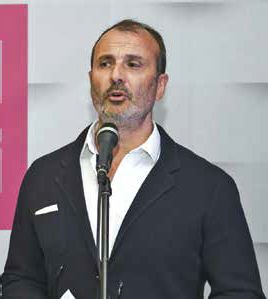
H.E. SEM FABRIZI, Ambassador and Head of EU Delegation in Serbia: SERBIA’S PROGRESS IS EVIDENT
1. The EU continues to believe that multilateralism is key to find more democratic and equitable solutions: we have ensured the longest period of prosperity and security ever experienced in Europe through the most advanced and sophisticated multilateral body. And we did it not out of naïveté but mindful of the ashes of the past and the hard reality that our national interests are better served and defended through the EU. A Union who has the critical mass and the right tool box to promote and protect EU citizens globally. A Union committed to a European perspective for the Western Balkans. So my message to Serbia and the Western Balkans is: keep focus on your strategic priority – the EU accession. Together we will be stronger to address today’s and tomorrow’s challenges.
2. Accession is a process and the priorities are clear. Serbia’s progress are evident in the area of the economic reforms. More evident and robust progress are needed in the wide area of rule of law, fundamental rights and good governance. For 2019 I see the need to focus on the constitutional debate for ensuring impartiality and efficiency of the judiciary; delivering a comprehensive reform of the Public Administration; stepping up the fight against corruption and organised crime with a solid track record; creating an environment that fully guarantees freedom of expression, including through a swift approval and implementation of the media strategy. I would like to see more quality and speed in the reform process. We are currently in the process of preparing the 2019 Country Report and the report on the Economic Reform Programme, which will be published this Spring and will assess the developments over the past 12 months. These will assess in details all the areas covered by Serbia’s accession to the EU.
3. Western Balkans and Serbia continue to figure highly on the agenda of the EU. 2019 is not changing that. The European Parliament Foreign Policy Committed has just visited Serbia. Other important EC Commissioners are planned to be in Serbia over the next weeks to push forward the EU – Serbia agenda, on the different reforms. The Digital Summit hosted in Belgrade at the beginning of April will be another important milestone to foster our cooperation. We have a full and intense programme ahead of us. In May we will have elections for the renewal – every 5 years – of the European Parliament. One of the greatest exercises of democracy in the world. This should not be seen as a challenge. Democracy never is. We will continue working and assisting the Western Balkans in their reform process. The pace of Serbia’s accession process remains in its own hands.

HANS FRIEDRICH SCHODDER, UN Resident Coordinator ad interim in Serbia/UNHCR Representative in Serbia: WE SUPPORT REGIONAL RECONCILIATION AND COOPERATION
1. The world is indeed facing uncertainties and big challenges such as climate change, environmental degradation, new and old conflicts, as well as increased inequalities. To address them we need more dialogue and solidarity among states and citizens, respecting diversity and treasuring forms of cooperation that promote peace and prosperity for all. To achieve sustainable development we will need to foster greater collaboration, coordination and commitment. The global Agenda 2030 for Sustainable Development is one tool for the reinvigorated multilateralism that is needed. The Paris Agreement on Climate Change is another important platform that calls for urgent action. Also the UN system is currently being strengthened to contribute to new forms of multilateral cooperation, globally and locally. The UN family can play a unique role in conflict prevention and resolution but also in promoting social justice. It supports states and other stakeholders to ensure fair, inclusive, transparent and sustainable development that does leave no-one – certainly not the most vulnerable or disadvantaged members of society – behind. This is important not only in implementing Agenda 2030 but also to help states in designing and rolling-out effective national and local development plans. The UN system enjoys strategic partnerships to identify and support coordinated and integrated solutions, act quickly and decisively when natural or men-made disasters hit and leverage development and climate financing as appropriate. Not all is doom and gloom. Just consider, for example progress in the Regional Housing Project and how it heals wounds from past conflict, or the recent North Macedonia name accord, which after many years of UN mediation, will also bring people in the region closer together.
2. Serbia can utilise financial support from the EU to undertake the reforms required to become a member of the EU. These investments can be reinforced by the state budget and other donors to support future generations’ needs for renewable energy, the protection of the environment and cultural heritage. A healthy economy needs an educational system that teaches the right skill set for the present and future local job market, to mention a just a few priority areas. At all times, respect of and investment in fundamental rights of all people will remain a strong priority as well as a tool for advancing diversity and inclusion as well as society overall. Nurturing good relations with all neighbours – maintaining respectful dialogue, mutual understanding and close cooperation in the region should also remain a priority. Many UN agencies actively support regional reconciliation and cooperation for example by promoting dialogue between youth and other stakeholders. Serbia is actively engaged in Agenda 2030 implementation. The design of Serbia’s development strategies offer opportunities to identify cross-cutting accelerators for Serbia to meet all Sustainable Development Goals. Promoting gender equality, improving the position of young people, upgrading environmental sustainability, as well as financing inclusive development, could, for example, be prioritized as such accelerators. Also during this year, the 19 UN Agencies, Funds and Programmes that constitute the UN family in Serbia, together with authorities and development partners, will evaluate the progress of the current Development Partnership Framework for Serbia (2016-2020), leading to priorities for the formulation of the next Development Partnership Framework.
3. I have no doubt that integration of the Western Balkans will remain on the agenda of Europe.

DUBRAVKA NEGRE, Head of the Western Balkan Regional Office of the Europen Investment Bank (EIB): SERBIA HAS MADE A GOOD PROGRESS
1. From the regional point of view, I would underline a historic agreement between now North Macedonia and Greece that ends a decades-old dispute in this region. Risky but successful set of events took place, which hopefully will contribute positively to the continuation of the EU integration processes of the North Macedonia. Not trying to change the past, but willing to shape future involves risk and courage in this region.
2. Regarding the economic criteria of the reform process, Serbia has made a good progress – budget deficit was addressed, macroeconomic stability preserved and inflation contained. But, Serbia needs to continue with structural reforms in order to be competitive and to improve its business climate. From our point of view, the main focus should be the prioritization of public investments and restructuring of public enterprises. The private sector is still underdeveloped and hampered by weaknesses in the rule of law and the enforcement of fair competition. So, we need more legal security for investors and more transparency in public procurement processes. All these areas are also important for the EIB Group activities.
3. The enlargement will certainly remain on the EU agenda, as enlargement is one of the successes of the European Union. We could witness that Austrian Presidency in 2018 and Romanian presidency in 2019 are keeping this region on top of the EU agenda. Important in this process is that countries aspiring to join the EU do their part of homework in many aspects. The EIB, as the EU Bank, is available to help them on that path through our products in lending, blending and advising. In 2018 only, our activities in the Western Balkans exceeded EUR 1bn in supporting social and economic development of the countries in this region.

SEBASTIAN SOSA, IMF Resident Representative in Serbia: THE IMPLEMENTATION OF REFORMS IS PROGRESSING
1. The IMF has indeed lowered its world growth projections for 2019 and 2020, mainly due to downward revisions for the euro area—especially Germany and Italy. Escalating trade tensions and the potential shift away from a multilateral, rules-based trading system could disrupt supply chains, with a significant impact on EU growth, notably if confidence is affected. This could hurt the economies of the Western Balkans including Serbia, due to their strong trade and financial linkages and integration into EU supply chains.
2. The implementation of structural and institutional reforms is progressing but needs to be accelerated to make Serbia a dynamic, private sector-driven market economy that will be able to compete successfully in the Single Market when Serbia joins the EU. Key priority areas include reducing infrastructure gaps, improving the business environment, reducing informality, modernizing tax administration, and completing the restructuring and strengthening governance of state-owned enterprises.
3. We understand that the process of EU enlargement to the Western Balkans will continue in 2019 and onwards. In the case of Serbia, we hope that reform efforts will be strengthened to close negotiating chapters already open and that additional chapters will be opened, providing a strong anchor for the implementation of the institutional and structural reforms needed to converge to EU standards and be ready to join the bloc.
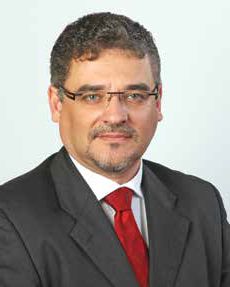
H.E. TOMÁŠ KUCHTA, Czech Ambassador to Serbia: WE NEED MORE OPTIMISM
1. I think we need more optimism here. The European Union proved in recent years that it is able to react to difficulties and overcome crisis situations. I believe that it is able to face issues caused by Brexit or other problems. Despite various challenges on the international scene, I am convinced that the Serbia´s accession process will continue. Let us concentrate on making it a success instead of drawing black scenarios. I would rather underline the importance of solving bilateral problems and promoting regional cooperation in the Western Balkan region.
2. First, I would like acknowledge enormity of this task. From our own history, we know how complex process it is. Moreover, Serbia´s challenges are even higher. I would like to express support of my country to the reform process in Serbia. It makes consistent efforts in many areas. Let me just mention the process of changing the Constitution to strengthen independence of judiciary or series of laws adopted last year by the Parliament. Here, I would like to highlight the importance of dialogue and inclusiveness of the whole process whether we talk about non-government sector or political parties. At the same time, there are areas where more progress is needed and they are well known: Let me just mention some aspects of the rule of law and media situation.
3. The enlargement policy is one of the most successful and efficient instrument of the EU. Despite scepticism expressed by some political tendencies, I am convinced that there will be sufficiently strong support inside the Union to keep the integration of Western Balkan countries to the EU on the agenda. I can promise that the Czech Republic will do its best in this regard.

H.E. KATI CSABA, Ambassador of Canada to Serbia: REFORMS ARE ON THE RIGHT TRACK
1. We believe the greatest risks are internal rather than external. Serbia holds in its own hands the keys to a more positive future. Serbia’s future, and its progress on the EU path, can be assured by a greater commitment to the reform process, and by addressing conditions which caused Serbia’s decline to “partly free” status in the recent Freedom House report. External factors definitely complicate matters – notably the current stalemate in the Belgrade-Pristina Dialogue.
2. Serbia is making progress, and some reforms are on the right track. After its recent visit to Serbia, the IMF delegation highlighted Serbia’s success in fiscal consolidation. However, the country needs to achieve public sector rightsizing, boost the efficiency of public enterprises, reduce administrative barriers and simplify complicated bureaucratic systems. By addressing these challenges, Serbia will unlock the potential for accelerated economic growth and converge towards EU standards.
3. Canada supports the EU integration of the Western Balkans, and we hope that the EU perspective for the countries of the Western Balkans will remain open. Canada, as you know, is not a member of the EU, so I am not in a position to speculate about the intentions of the EU or individual member states.

H.E. DR. ATTILA PINTÉR, Hungarian Ambassador to Serbia: COMMITTED SUPPORTER OF THE EU-ACCESSION
1. First of all, Hungary is and will remain a committed supporter of the EU-accession of Serbia. This will continue to be a priority for the Hungarian Government even after the exit of the UK from the EU. Great Britain is an ally and friend of Hungary and accordingly, we regret their exit from the European Union, but respect the decision of the British people. Losing a supporter of enlargement process is an unfortunate turn of events. This way, the already ailing pro-enlargement voice can be further weakened in the EU, which I think will not bring forward a quicker pace for Serbia’s accession agenda.
2. The Serbian government is steadily working on all important reforms in a difficult situation. As the ambassador of a neighbouring country, I have to underline that the measures taken towards the protection of minority rights are exemplary and the support to local education in the mother tongue of ethnic minorities is significant. Economic issues and the rule of law are also highly important factors for Serbia. Therefore, development in these fields are crucial for the long-lasting stability of the country.
3. It is my sincere belief that enlargement policy should be a high priority of the EU in the years to come. The European Commission’s 2018 Western Balkans agenda was a good start, but concrete measures must follow. It is unacceptable for the Hungarian Government that the European Commission does not want enlargement in the Balkans until 2025, despite the fact that this is in Europe’s economic and security interests. The region already has deep connections to the EU in the field of economy, commerce and infrastructure and we should seize the historical opportunity to enrich the European family with new members. The renewed interest and influence of third-party actors also compel us to take decisive action in this field.
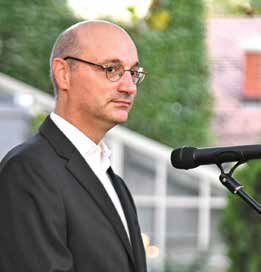
H.E. FRÉDÉRIC MONDOLONI, France Ambassador to Serbia: WE SHOULD CONSOLIDATE THE EU
1. As you rightly mention both Europe and the world are facing major challenges which will require dedication and efforts in the coming period. Serbia is committed to join the EU and France supports this perspective: the main risk would be that this goal would be hampered. To prevent this, it is of utmost importance that Serbia continues its reforms, especially on rule of law, and that the dialogue between Belgrade and Pristina resumes – which implies that Pristina cancels without further delay its tax on goods from Serbia and Bosnia.
2. Serbia has already accomplished difficult reforms in the economic area. It must be complemented by equivalent efforts on other crucial topics described in the negotiation chapters – and especially rule of law. I know this implies difficult reforms but EU accession will also rely on Serbia’s capacity to carry them out effectively. The priorities for 2019 remain the same: accomplishing the reforms set out by the negotiation chapters, to close them as soon as possible.
3. We should consolidate the EU before any new enlargement. This is what France is striving for at the moment. The reform both of EU and Serbia could be carried out in parallel, so that Serbia can join the EU at the end of both processes. EU and France want Serbia to join in, there is absolutely no doubt, but EU must be in the appropriate condition to welcome it and Serbia must also make the necessary efforts to make its accession possible.

H.E. OANA CRISTINA POPA, Romanian Ambassador to Serbia: COMMITTED TO SUCCEED ON THE EUROPEAN PATH
1. The challenges on the international stage deem necessary an active role of the Union in global affairs, in line with its Global Strategy on Foreign and Security Policy. Also, we have to make a common effort towards identifying the proper solutions with the aim to strengthen peace, freedom, stability, prosperity, social solidarity and cohesion, that the project has been delivering since its inception. A strong, cohesive and enlarged Union will surely be able to tackle all the challenges that rise up in Europe and worldwide. I believe that one of the major challenges for the states in the Balkan region is internal and refers to maintaining progress in the ongoing reform process. Serbia, through the public positions expressed by its leaders and through a multitude of actions, showed that is committed to succeed on the European path. I strongly encourage
2. Serbia to further pursue sustained reform efforts and demonstrate track record. Rule of law, independence of the judiciary and freedom of media are fundamental conditions for the accession of any country to the EU. Thus, at the core of the reform process, focus should be set constantly on implementing and guaranteeing these EU benchmarks.
3. The Western Balkans are among the priorities of Romania’s Presidency of the Council of the EU. In this regard, we will continue to support the European perspective of the countries in the region on the basis of their own merit and compliance with process-specific criteria. Romania will remain, in 2019 and beyond, a firmly committed promoter of the enlargement policy.
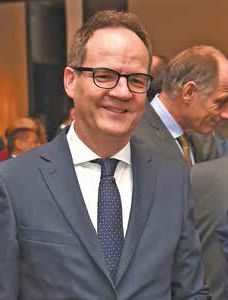
H.E. PHILIPPE GUEX, Ambassador of Switzerland to Serbia: REFORMS HAVE IMPROVED THE BUSINESS CLIMATE
1. The main risk is not an event but a non-event: a period of no deal, instead of normalization of relations between Belgrade and Pristina which remains crucial for the European future of Serbia. However, a normalization agreement which would not be implementable by the parties would be highly risky for Serbia and the region. A future agreement has to be comprehensive as it has to resolve all open issues. No space has to be left for different interpretations. It seems that the negotiators are far away from this goal. Therefore, I believe that a short term quick fix would bear a risk for Serbia and the region.
2. There is no doubt that the ongoing reforms have improved the business climate in Serbia within the last few years. But much more can be done as there is currently still a lack of clear perspective for many people living in Serbia. I feel sorry for those young men and women who tell us that they have to leave the country because their families do not have the right connections to find a proper job. The best way to mitigate the brain drain in Serbia is to improve the rule of law, to reform the judiciary and not to give anymore a chance to corruption. These would be my priorities in 2019.
3. It is not the role of a non-EU country like Switzerland to make speculation about the EU enlargement agenda. As Switzerland belongs to the top four donor countries to Serbia, we very much follow Serbia’s EU accession process. Europe would not be Europe without Serbia and the countries in the region. Europe needs Western Balkans as much as the Western Balkans needs Europe. Therefore, I am convinced that there is no better option for Serbia than EU accession.
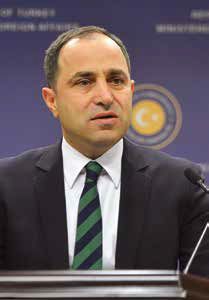
H.E. TANJU BILGIÇ, Ambassador of Turkey to Serbia: SUPPORT TO WESTERN BALKAN
1. As a non-EU country we do not know the inner discussion of the EU. Nevertheless, itis not new to say that this year would be a very active year for European politics. Brexit negotiations reached a new stage, the EP elections is going to take place this year and Juncker Commission’s tenure will come to an end this year as well. For this reason, it might be expected that the EU would not be able to focus much on the Western Balkans. We are hoping that the Belgrade-Pristina dialogue process would not be stalled by upcoming political developments in the EU or elsewhere. By using this opportunity, I also would like to say few words concerning my country’s stance towards the Balkans as an answer to a campaign which aims to portray Turkey as a rival to the EU in the Western Balkans. Since the end of the Cold War, Turkey has always supported all the Western Balkan countries’ Euro-Atlantic integration as long as it is in line with their national will. It is still the case, so. We believe that Turkey and the EU can co-operate on and join their efforts towards concrete steps.
2. Serbia has so far opened 16 negotiation chapters and closed 2 of them. Our expectation is that Serbia would take further steps forward in its negotiation process during Romanian presidency. However, as I have tried to point out above, the EU will be very busy with its internal issues this year. According to the latest information, it is envisioned that the EU Commission’s Country Reports (Progress Reports) on the candidate countries, which are expected to be published in April under normal conditions, would only be finished after the EP elections at the end of May.
3. It is a fact that the EU has not been able to focus its energy on enlargement due to the impact of big crises, such as the Euro crisis and the migration crisis, which the EU has faced in recent years. 2019 also seems to be such a year. First of all, there is a challenge like Brexit which it has never faced before. There are also Commission and EP elections. However, I do not believe that the Western Balkans will fall from the EU’s agenda in the period ahead due to all these events.
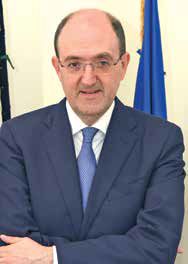
H.E. CARLO LO CASCIO, Italian Ambassador to Serbia: EUROPEAN INTEGRATION OF SERBIA
1. Global dynamics can often appear turbulent, but we have to maintain a certain degree of optimism. The last word on Brexit has not been said yet, while the trade negotiations between the United States and China are still ongoing. Italy’s position on a multilateral and consensual approach is very clear: we are against any unilateral and protectionist decision that can only harm growth and put an unnecessary obstacle to the normal flow of goods and services. That is also why we strongly believe in the European integration of Serbia, both at the political and economic level, in order to share the prosperity and stability of our single market.
2. As our Prime Minister Giuseppe Conte pointed out during his recent visit to Serbia, we strongly support Serbia’s path towards the EU, so that we could define ourselves “Ambassador of Serbia to the EU”. In the last few years, Serbia has made several progresses, but we all know that much still needs to be done. We are here to foster this progress. As a matter of fact, Italy and Serbia have recently signed a number of agreements in order to improve the situation in many sectors: from the fight against corruption and organized crime, to cooperation in scientific and technological research as well as in the agricultural field, just to mention some very different examples. We hope that Serbia will rapidly continue on the path of reforms, in the economy but also in the administration and, most of all, in the rule of law, in the primary interest of citizens and the further purpose of speeding up the pace of accession negotiations.
3. It is difficult to foresee what will happen to European foreign policy after this spring, but I would certainly bet on Italy’s continued interest in promoting EU enlargement to the Western Balkans, and especially to Serbia.
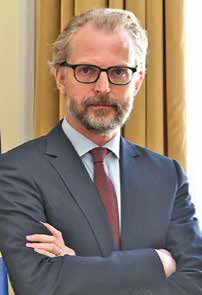
H.E. NIKOLAUS LUTTEROTTI, Austrian Ambassador to Serbia: WE STAND READY TO FULLY SUPPORT SERBIA
1. It is difficult to predict what will happen and what effects political and economic uncertainties, that are inherent in international relations, will have. Regardless of these uncertainties, it would be important for Serbia to continue focusing on its reform priorities for this year. And I am encouraged when I hear the President and Prime Minister repeatedly saying that the reform process will continue because it is in the interest of its citizens and the country. Serbia has it in her hands to progress on the EU accession process through a continuation and even intensification of reforms and reform implementation.
2. I think that Serbia has achieved already quite substantial progress on its reform path. But allow me also to express my hope that Serbia will continue and even intensify her reforms. However, looking at it through the prism of the EU accession process I would hope that real progress can be made in the area of the rule of law, the independence of the judiciary, the fight against corruption and organized crime, the freedom of the media and the strengthening of independent institutions. These reforms will also have a positive impact on the economy. There is a lot of potential to increase economic growth and prosperity in Serbia. The Austrian business community is among the largest investors in Serbia. We have an interest to see Serbia continue on its economic growth path. And we stand ready to fully support Serbia on its path towards becoming a member of the European Union.
3. I am convinced that it will remain on the EU agenda because it is in the interest of EU. Austria will certainly remain a staunch supporter and advocate of EU enlargement to the Western Balkans and to Serbia in particular. Just to highlight one example: in February this year, the Austrian Federal Minister responsible for European integration, Gernot Blümel, invited his counterparts from the “Western Balkans Six” to Vienna to discuss their ideas on the future of Europe. We think that the future members of the EU should participate in the debate on the future of Europe already now and have a chance to give their input.

DANIJELA FIŠAKOV, President of the Slovenian Business Club: REFORMS IN SERBIA ARE ON THE RIGHT TRACK
1. Judging by their geographical location, Serbia and the Balkan region cannot be immune to the developments in the global community. And the smallest “wave« at another end of the world produces a response in this area. Closer and stronger the source, the bigger the impact of the wave. The United Kingdom, the EU led by Germany and France, the United States, Russia and China are countries which interests intertwine with this region and which impact on the region is significant. In this sense, apart from the aforementioned examples, we should also focus on the development of relations in the US-Russia-China triangle. We should view the seemingly distant upheaval in Venezuela, as well as the events in Syria and Ukraine, in the same context, although they have somehow disappeared the headlines recently.
2. Without a doubt, reforms in Serbia are on the right track and heading in the right direction. However, the roots of negative developments are too deep and have been strongly resisting the faster progression of positive changes. As a child of an agronomist, I cannot resist the comparison that is understood not only by every farmer, but also, I am sure, every other man with a close understanding of rudimentary natural laws. In order for the field to be fruitful, weeds must be rooted and healthy seed should be planted. This must be a systemic priority, not only next year, but also in all the years to come.
3. While there may sometimes be different views in political circles, the prevailing view is that EU enlargement to include the countries of this region is in the interest of the Union itself. The strategic significance of this region, regardless of its current economic inferiority, is too great to be so forgotten. If, however, the EU withdraws enlargement from its agenda, America and Russia are still interested in the region. Serbia needs to take advantage of this interest y but also to steadfastly continue on its path towards achieving EU standards, not for others, but for itself.

JELENA PAVLOVIĆ, Chairwoman of AmCham’s Managing Board: SERBIA HAS ITS EUROPEAN AGENDA
1. Bearing in mind that two-thirds of our exports end up in the EU, and that the most important investments come from there, the biggest external risk to our economic growth is a slowdown of the EU economies. The entire region is exposed to this risk, which would result in a decline in the demand for our products in the countries of the region that, in turn, would have an additional negative impact on us. The most significant internal risk is political in nature and refers to resolving the issue of Kosovo and Metohija. A recent decision of Pristina to impose a 100% tax on goods from Serbia has already caused damage. Any possible further worsening of the relations would negatively affect economic activity, investments and growth throughout the region.
2. Last year, Serbia achieved economic growth, and managed to maintain low inflation and a stable exchange rate. The budget is consolidated, the share of public debt in the gross domestic product declined, employment was on the up, according to the available statistics, and progress was made in the reform of public enterprises. All of this represents a good basis for implementing the long-awaited structural reforms that we need to achieve the above average economic growth in the future and not to lag behind the European countries which is what we have been doing for years. In terms of the structure of future economic growth, we expect and hope for greater participation of domestic private investments. In the Business Climate Survey, the private sector highlights the following obstacles as crucial – shadow economy, corruption, inefficient court procedures, non-transparent and unpredictable tax policy, and inconsistency in the implementation of regulations. That is why building the institutions to suit market economy and the rule of law is the hardest and most important order of business that Serbia has to do this and the following years. AmCham will be a constructive partner of the state in this endeavour.
3. The enlargement process will be on the European agenda this year too, however, the question is, how fast will the chapters going to be opened. The answer to this question equally depends on the dynamics of our internal reform processes, as well as on the situation in the EU itself, where the May elections for the European Parliament hold special importance this year. In any case, Serbia has its European agenda and the reforms foreseen by it should be implemented as soon as possible, in order to regulate and improve our the living and working conditions in our society for our and the generations to come.

YANA MIKHAILOVA, Foreign Investors Council President: REFORMS ARE ON THE RIGHT TRACK
1. Serbia has the strongest trade relations with the EU and is determined to join the Union, so events that impact the EU market have a certain impact on Serbia too. We live in a global world and having in mind that Serbian internal market is relatively small, it makes it more vulnerable to outside influence, namely the state of the European market or United States-China relations, etc.
2. The reforms are on the right track but we need to expedite them to reach the set goals which are fully sustainable and competitive business climate, strong economy which can match developed markets, and high living standard. We see the priorities for this year as follows: further development of sustainable fiscal consolidation, improve law implementation and provide more transparency in public consultations with focus on reforms in priority topics such as tax and labour, digitalization& e-commerce, real estate, inspections, food safety, and overall legal framework, with emphasis on regulations on bankruptcy and foreign exchange operations.
3. The EU has had a strategic orientation towards enlargement since its establishment. Up until now, it has been only a matter of momentum and pace and not of a strategic orientation. So, we believe that EU enlargement to the Western Balkans will remain on the EU agenda, especially knowing that the new strategy for the Western Balkans was presented last year. On the other side, we are aware of the upcoming EU elections for the new European Commission and Parliament this year which might have an impact on the EU foreign policy.
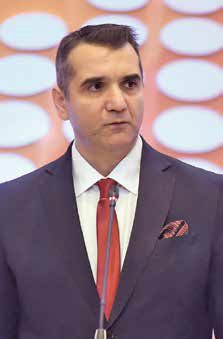
DEJAN DJOKIĆ, Chairman of NALED’s Executive Board: NALED APPEALS FOR FASTER REFORMS
1. A global recession, that could develop by the year-end, would surely be the riskiest event. At a time when we are trying to reach the growth rate of 5-6% per year, the new world crisis would lead to stagnation and have adverse effects on the economy and citizens. I hope that negative forecasts will not be come true. The possibility of the global recession happening is a warning to us to expedite the work on boosting competitiveness and developing a better business environment.
2. There are many reforms that are either started to be implemented or are already implemented. NALED has always been appealing for these reforms to be expedited and more determined. By this we mean curbing shadow economy, continuing to work on developing e-government, resolving property issues, spatial planning and construction, and strengthening agriculture and health care. In addition to the need to adopt a new action plan for the implementation of the National Programme for Curbin Shadow Economy, NALED has outlined a number of priority measures contained in the Gray Book 11, among which I would like to highlight the reduction of salary tax and contributions, the establishment of an electronic public procurement system, a public tax and fee register, e archives, electronic registration procedures for agricultural holdings and allocation of incentives. Businesses are also very interested in the Tax Administration improving its procedures, namely the electronic issuance of tax certificates and digitization of documents for entrepreneurs who pay flat tax rate.
3. The Western Balkans will never disappear from the European agenda, but it depends on us where we will be positioned in that agenda. If there is progress in resolving the issue of Kosovo, this, together with the progress made by North Macedonia in relations with Greece, would be very important for expediting the process of EU integration.

DJORDJE PETROVIĆ, Founder and Director of the Dutch-Serbian Business Association: REFORM PACE SHOULD BE FASTER
1. I think that the situation with Priština introducing tax on Serbian goods caused very strong tensions, but also great problems for all the companies operating here, since they are prevented from selling goods and thus making profit.
2. There is progress in the right direction, which is certainly encouraging, but I also think that the pace of reforms should be much faster. From the business point of view, there is plenty of room for improvement of the business climate, which would make it easier for all companies operating in Serbia, both domestic and foreign, to do and improve their business. Some of these steps would be reducing salary tax and contributions, simplification of bureaucratic procedures and additional cooperation between institutions in paying attention to the needs of businesses, as well as implementing subsequent actions in accordance with those needs.
3. I think that, at this moment, all the countries in the region are far from the EU membership and I don’t see them becoming members in the near future.

ZAFIRIS LAMPADARIDIS, President of the Hellenic Business Association of Serbia: BUSINESS CLIMATE HAS IMPROVED CONSIDERABLY
1. Brexit will clearly affect countries currently pursuing the EU membership. The United Kingdom, together with its former partners in the EU, has been a major player in the European integration endeavours of the Balkans and Serbia, and has been allowing these countries to look beyond divisions and disagreements. The current situation leaves room for possible deterioration of trade conditions, business cooperation and economic development.
2. The business climate in Serbia, compared to previous years, has improved considerably, but nevertheless, the government needs to make concrete reform proposals and build a business portal for communication with the authorities in Serbia in order to have an effective business performance. Priority in that case should be given on promoting solid business ethics and high corporate governance principles within and towards local companies, the government and investors.
3. We want to believe that the EU enlargement to the Western Balkans is feasible and possible because it will act as a catalyst to stronger business cooperation among European countries themselves. The economic cooperation is an important mechanism/process/policy which leads to reconciliation in this post-conflict region and secondly, through connecting, networking and adjusting of business environment, it enhances the growth of trade and investments – particularly foreign direct investments – thus providing an important prerequisite for a faster economic growth.
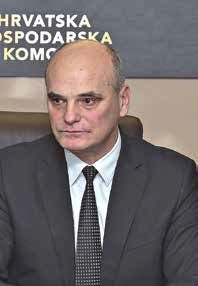
PERO MIJAKIĆ, President of the Croatian Chamber of Economy’s Office in Serbia: WORK SHOULD BE DONE ON RAISING LIVING STANDARD
1. I would single out the relations between the US and China as the riskiest event at the moment, plus there are also relations between Russia and the US. China and Russia want to expand their economic influence in this area, which the US and the EU are not too pleased about, especially when it comes to energy sector. Serbia has very good political relations and economic ties with those countries. We have witnessed the US and the EU sanctions towards Russia. Serbia will surely not follow such a policy which may cause some problems, because the EU demands a unified approach from all its members.
2. It is evident that the reforms in Serbia are being implemented and they have yielded results that can be seen by macroeconomic indicators. Of course, reforms need to be implemented faster in all areas. It is necessary to open as many chapters as possible in the negotiations with the EU and, of course, to close even more. The approach to the EU membership should not be political, but economic. One should listen to economists when they talk about the benefits of membership in such a large and regulated market. Serbia needs to reform its education system in order to prepare young people for those jobs that are really in demand in the labour market. I am aware that my colleagues from the Chamber of Commerce and Industry of Serbia are actively working on the proposal of the dual education model. You also need to work on raising the living standard in order to prevent brain drain since lack of workforce is going to become a huge problem.
3. No, it will not disappear from the agenda. I am confident that both Serbia and the EU are on the same page when it comes to enlargement. Serbia and the Western Balkans are a part of Europe.

HUGO VAN VEGHEL, President of the Belgian-Serbian Business Association (BSBA) Belgrade: WESTERN BALKANS WILL REMAIN ON THE EU AGENDA
1. The geopolitical theatre has its influence and Brexit is in focus, but the growing populist anti-EU trends are more worrying. Since the Schumann declaration the EU has become a unique economic and political union between countries and is now obliged to prioritise on its own internal challenges. I see no new accessions until internal matters have been solved.
2. Let me focus on one item and stay positive. If we look at the 2016/2017 Annual report on European SMEs, we have enough evidence to call SMEs the backbone of the EU’s economy. Large investors bring more immediate employment, but the strongest resilience in any economic downturn is created by the SMEs. Initiatives to support new entrepreneurship should be boosted. We noticed in a recent presentation of RAS (Development Agency of Serbia) that there are new incentives but mainly focus only on manufacturing and services sectors which may be subject to international trade. On January 28th, the Ministry of Economy launched support to new entrepreneurship. Both initiatives are too weak to initiate change. Interest in export-oriented activities is quite understandable, but it is time to think about socio-economic development in a more holistic context.
3. In 2010, the EU Institute for Security’s paper titled “Western Balkans and Turkey: Unfinished business in Europe” shows that the Europen “business” is far from being finished. The ‘Balkan question’ remains a ‘European question’. If we look at it from the economic development view, than we are faced with different speeds, maintained by specific interest groups. Only if all parties realize (and admit) that there are common goals and shared interests they will work on joint actions. The Western Balkans will remain on the agenda even long after 2019.